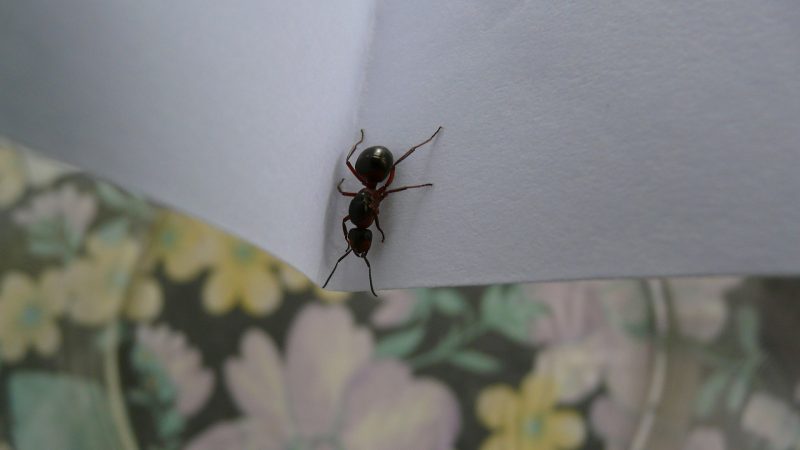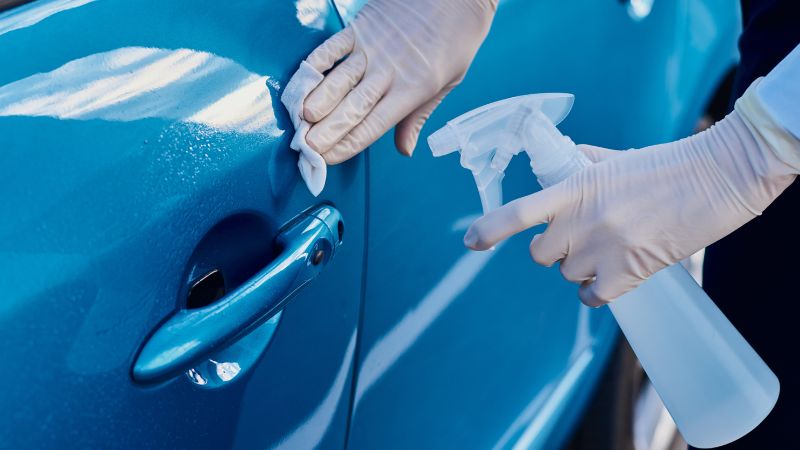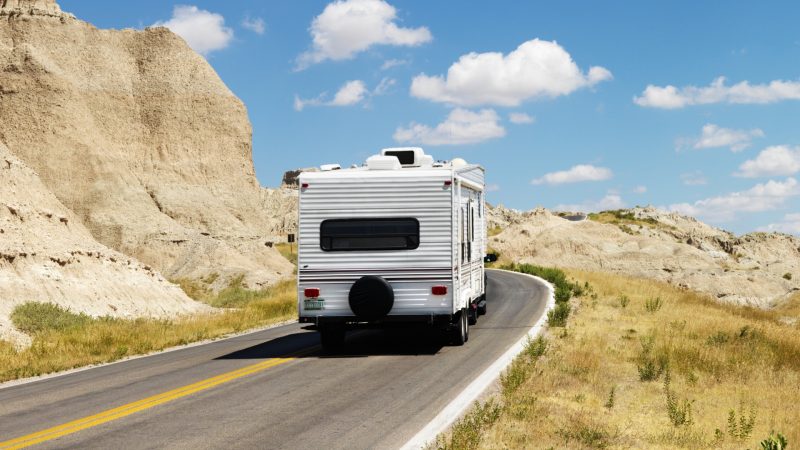If you are like most people who have an RV (recreational vehicle), you probably take a lot of pride in your vehicle. You keep it clean and well-maintained, so what to do if you have an ant infestation in your RV?
You can get rid of ants in the RV by using natural repellents such as vinegar spray and cinnamon powder. Simply apply it to the area in your RV where you see ant trails to eliminate ant pheromones. Pesticides that can be used include ant foggers, baits, sprays, and similar. However, ensure that you do not use the RV during treatment with toxic pesticides.
In the following sections, you can find out our step by step instructional guide for getting rid of the ants in the RV. Follow our guide and tips and you will clean your RV from ants without a hassle.
Why Are There Ants in My RV?

There are only two reasons why you will find ants in your RV—either they’re looking for food or they’ve already found it. Ants are foraging animals, which means they leave their nest to go “scouting” for food.
Additionally, if your RV is parked near an ant nest, ants will crawl onto and inside your vehicle, looking for food. If they find it, they will leave a trail of chemicals behind called pheromones. This helps other ants locate the food and eventually bring it back to their nests to share with the colony.
Keep in mind that even small amounts or crumbs of unsealed food, or even a spilled sugary drink and other beverages, are already enough to attract ants towards your vehicle.
How to Get Rid of Ants in RV: Step by Step Guide
1. Move Your RV to Another Location
If you have ants in your vehicle, you may be currently parked near an ant nest. Before you start managing your ant problem, move your vehicle away from the problem. Otherwise, your efforts may be in vain, as more ants could crawl onto your RV while cleaning it.
Related: How to Get Rid of Ants | Safe and Effective Methods
2. Check and Store Properly All Food Items in Your RV

Check if the ants have come into contact with the food stored inside your RV. Any food touched by ants should be thrown away immediately, as ants can transmit diseases.
Remember, ants are tiny. Don’t assume that your bread or other items are safe just because they are wrapped in plastic bags. Unless the bags are entirely sealed, ants can and will find their way in.
Also, check the outside of food containers for any food residue. For example, jelly or honey jars. Even a little glob of jelly stuck to the outside of a jar will attract ants. Wipe down the outside of these containers with a mixture of water and dish soap to ensure they are clean.
3. Clean the Outside of Your RV
You can do this yourself or take your car to a professional cleaner. If you wash your vehicle yourself, ensure enough pressure in your hose to remove any ants that may still try to cling to the surfaces of your RV.
Moreover, be sure to check inside your engine. Depending on the severity of your ant problem, these insects may have found their way under the hood. They can chew cables or wires, causing expensive damage to your engine.
4. Clean the Inside of Your RV

Vacuum your RV thoroughly. Use a nozzle attachment to efficiently reach into cracks and crevices where ants may hide. Wipe down all other surfaces to erase pheromones.
This will help prevent new ants from finding their way inside your RV. Remove all trash from your vehicle, as even small amounts of food residue on discarded packaging can be enough to attract ants.
Related: What Do Ants Eat? | Ant Feeding Habits
5. Ant Killers (Ant Bait, Spray or Fogger)
Which option you choose will depend on the magnitude of your ant problem, whether or not you want to use pesticides and how quickly you need the ant problem resolved.
Ant Bait
Ant bait is a highly effective and safe way to eliminate an ant problem. This option does, however, require a bit of patience. Ants who come into contact with the bait do not die immediately. They take the bait, which they believe to be food, and return to their nests to share with the colony.
Eventually, a toxin in the bait will wipe out the entire colony, including the queen. But, as mentioned, this can take time and may not be ideal in situations where you are already underway in your RV.
If you have time on your hands, you can try this method. Here are some effective products you can use:
- ATTRACTS & KILLS: Effectively targets and eliminates common...
- KILLS THE ANTS YOU DON'T SEE: Terro ant bait is designed to share...
- FAST-ACTING: Noticeable ant activity reduction within days as...
- READY TO USE: Simply place ant baits indoors with no setup...
- VERSATILE HOME PLACEMENT: Ideal for use as terro ant traps along...
- Attracts & Kills – Kills common household ants including...
- INTENDED FOR RESIDENTIAL USE - This product may only be used to...
- ECONOMICAL SOLUTION - This fast-acting formula is very effective...
- FLOWER BULB PROTECTION - Mole & Gopher Killer will also help...
- EASY TO USE - Mole & Gopher Killer is conveniently ready to use...
- 10 stations of 0.25oz bait. ready-to-use stations
- 3.0% Sodium Tetraborate Decahyd rate (borax)
- Indoors and Outdoors-Residential and Commercial
- Place the Gelanimo ant bait stations where the ants are trailing
Ant Spray
Ant spray kills ants on contact, which can be ideal in situations where you just need the problem taken care of quickly. Just remember that if you see one ant, there are probably a number of them nearby that you do not see.
As such, this method, while effective, will take a bit of persistence. Just remember to ventilate your RV properly if you spray a lot of this product inside to avoid getting suffocated by the product.
The following are tried-and-tested products that are effective at removing ants:
- Raid Ant & Roach kills a wide variety of insects including...
- Kills on contact and keeps killing with residual action for up to...
- Ant & Roach spray with no lingering chemical odor
- Easy-to-use ant & roach killer that can be applied to surfaces...
- Retreat with ant & roach killer every 4 weeks as necessary to...
- Raid Ant & Roach kills a wide variety of insects including...
- Crawling insect killer with residual insecticide power for up to...
- Also kills palmetto bugs, silverfish, crickets, earwigs,...
- Ant & Roach spray with no lingering chemical odor
- Easy-to-use Ant & Roach killer for application where listed bugs...
- Start killing ants, roaches, spiders, fleas and ticks with Ortho...
- This insect control spray kills listed bugs and protects your...
- Use this indoor insect spray in kitchens, bathrooms and...
- Create an insect barrier anytime as a preventative treatment or...
- Apply Ortho Home Defense Max Indoor Insect Barrier using the...
Fogger
Using a fogger in your RV should only be considered if you have a severe ant problem. Just read the instructions on the product label carefully, and be prepared to air your vehicle thoroughly for several hours after use.
It’s also a good idea to run the a/c system as part of the “airing out” process, as this will help expel the product from your ventilation system.
For more chances of success, try these following products:
- KILLS ON CONTACT: Hot Shot Fogger With Odor Neutralizer kills on...
- KILLS HIDDEN BUGS: Creates a fine, penetrating mist that reaches...
- WHERE TO USE: Use in enclosed spaces such as apartments, attics,...
- NON-STAINING: This clear, non-staining formula won't leave a wet,...
- EACH CAN COVERS 2,000 CU FT: Treats 2,000 cubic feet of...
- For Use Only on Ornamental Crops and Growing Crops in Commercial...
- Pyrethrum TR is a ready-to-use ultra low volume insecticide...
- Pyrethrum TR is used as an early rotational insecticide and is...
- It effectively controls aphids fungus gnats mites and whiteflies...
- OFF! Outdoor Fogger, 16 OZ (Pack - 6)
6. (Optional) Natural Ways to Get Rid of Ants in Your RV
If you prefer to avoid the use of pesticides in your RV, you could opt for more natural ant control methods, many of which can already be found in your kitchen and at home.
You don’t have to rely on chemicals or pesticides to remove ants from your RV and keep them from returning. If you prefer a more natural, all-organic route, try one (or even a few!) or these simple and remedies:
Vinegar and Water, Mixed 50/50

This remedy acts as a two-part solution in your fight against ants. First, ants hate vinegar and will avoid surfaces on which it has been sprayed. Second, vinegar does a great job of removing ants’ pheromone trails.
Mix a 1:1 ratio of water and vinegar solution into a spray bottle, and spray and wipe down the hard surfaces in your RV. Just remember that vinegar is acidic and isn’t meant for all surfaces.
Cinnamon Powder And/Or Mint Leaves
Both of these natural spices act as an ant deterrent. Cinnamon can even kill ants if they come into direct contact with it. Sprinkle the cinnamon directly onto the ants or the areas where you have last seen them crawling.
On the other hand, you can also bundle mint leaves together and place them in these areas as well. After your ant problem has subsided, vacuum or wipe up the cinnamon and remove the leaf bundles.
Diatomaceous Earth
Diatomaceous earth is an all-natural substance you can find at most hardware or home improvement stores. This product is made from fossils of sea algae and tiny sea creatures which kills ants by drying them out.
- 100% Chemical-Free: Made from 10lbs of food-grade freshwater...
- OMRI Listed for Organic Use: Listed with the Organic Materials...
- Powder Duster Included for Easy Application: Comes with a powder...
- Sourced and Packaged in the USA: Responsibly mined in Nevada and...
- Multi-Purpose Use Indoors and Outdoors
First, purchase a disposable mask to protect yourself from inhaling too much of the product during application. Although the product is all-natural, your lungs could still get irritated if you breathe too much of it.
Now that you have your mask, sprinkle a thin layer of the product around your RV. Apply it to all surfaces, including floors, carpets, seats, windows and door frames. Leave the product to sit for 48 hours, then wipe or vacuum it up.
Dish Soap and Water
Using a solution of 3-parts water to 1-part dish soap is another way to fight an ant infestation without harsh chemicals. Mix the solution into a spray bottle and spray directly on ants and anywhere they have been crawling.
The mixture will kill ants by suffocating them as the soapy water bonds to their exoskeleton. The mixture will also help you keep surfaces clean and free from food residue, which will discourage ants from coming back.
Chalk
If your RV is parked on a hard surface and you have already cleaned the inside and outside of the vehicle, try drawing circles around your tires with chalk. It is unclear why, but ants avoid walking across chalk lines. This can prevent more ants from crawling inside your RV searching for food.
Ways to Prevent Ants in Your RV
Now that your RV is free from ants, let’s look at some strategies to help you prevent future infestations:
Keep Everything Clean
After each meal or meal preparation, wipe down all surfaces inside the vehicle and check your floors for any crumbs or spills. Remember that even minimal amounts of food can attract ants.
Store Food Properly
Invest in food storage boxes, either plastic or glass, that can be sealed tightly. Any opened food should be stored in these containers, including chips, bread, candy, etc. Store fruit and vegetables in the refrigerator, if possible, to lessen the chances of ants to get to them.
Take out Trash Regularly
It’s convenient to have a trash can in your RV. Ensure you don’t leave it full of garbage for more than a day! Ants can easily pick up on the scent of garbage and even small amounts of food residue on the packaging.
What to Do If You’ve Rented an RV With an Ant Problem?

If you have rented an RV and discover an ant problem, try to assess if it began after you rented the vehicle or if it was an existing problem before you rented it. Afterwards, contact the rental company immediately.
Tell them when you discovered the problem and how severe the infestation is. It would be best to check with the rental company before using any harsh or messy pesticides inside the RV, as it could potentially cause damage to the vehicle, which you may have to pay for.
Can Ants in an RV Pose a Health Risk?
Yes, ants can transmit diseases like salmonella and E. coli. They do this by crawling across areas full of bacteria and then onto our food. This is why it’s important not to eat food that has come into contact with ants.
Additionally, ant bites and stings can cause allergic reactions and/or infections. If you or someone you love is allergic to ant bites, talk to your doctor about being prepared while underway in your RV. They may recommend traveling with an epi-pen, which will stop allergic reactions to ant bites.
Lastly, infection is another concern. If you get bitten or stung by an ant, clean the area and don’t scratch it. Even mild scratching can be enough to create little tears in the skin and expose them to the bacteria on your fingers or the environment.
Related: Do Ants Carry Diseases (Germs)?
List of Sources
Chalissery, J. M., Renyard, A., Gries, R., Hoefele, D., Alamsetti, S. K., & Gries, G. (2019), Ants Sense, and Follow, Trail Pheromones of Ant Community Members.
Environmental Protection Agency. (n.d). Safety Precautions for Total Release Foggers.
Ogg, B. (n.d.). Ant Baits: A Least-Toxic Control.
Ramsey, M. (2013). How to Control Ants.
Tschinkel, W. R. (2005). The nest architecture of the ant, Camponotus socius.
- Bed Bug Surge 2025: How to Detect, Prevent, and Safely Eliminate Infestations in Top U.S. Cities - June 18, 2025
- Asian Needle Ants Invade US Homes: 2025 Guide to Identification, Risks, and Effective Control - June 11, 2025
- New World Screwworm Alert: How US Livestock Owners Can Prevent Outbreaks and Protect Herds [Summer 2025 Update] - June 8, 2025











